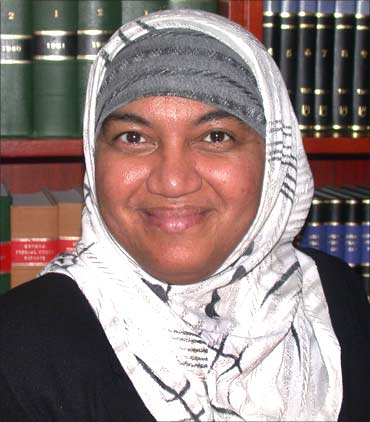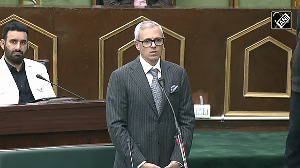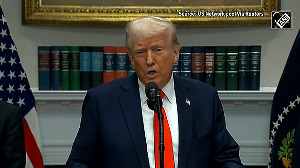 Indo-Canadian Dr Sheema Khan was amongst the five South Asian authors invited to the 12th Blue Metropolis International Literary Festival in Montreal from April 21 to 25.
Indo-Canadian Dr Sheema Khan was amongst the five South Asian authors invited to the 12th Blue Metropolis International Literary Festival in Montreal from April 21 to 25.
The other Indian authors on the list were M G Vassanji (A Place Within Rediscovering India) Gita Audhya (In Pursuit of Love, Spirituality and Happiness) and Priscila Uppal (Traumatology). They joined over 200 authors from across the world.
Khan was born in Varanasi and she was just three when her family migrated to Canada. She is now "40 something."
Her book Of Hockey and Hijab: Reflections of a Canadian Muslim Woman was the subject of her discussions at the international literary event.
Before traveling to Montreal, Khan spoke to India Abroad about niqab, domestic violence and the other issues that she has dealt with in her book.
She said the kind of controversy currently raging over the veil was polluting.
"We have a Charter of Rights in Canada," she said. "I may not agree with this (women wearing niqab/burqa), but I am in support of women exercising their choice in what they wear."
Khan, an Arabic scholar, said those who don't wear a burqa don't violate any religious norms. "There's specific reference (in the Koran) to the wives of the Prophet behind the screen," she explained.
"It also says that the wives of the Prophet are not like other women. It seems to be very specific instructions for them. They are role models. I am just saying the interpretation would be that some women have taken instructions to the wives of the Prophet as something they should also be following."
About the division within the Muslim community on this issue, she said "I don't think you can have one voice."
"You have to have women wearing the niqab talk about it," she added. "They can't hide behind the niqab. When they don't talk they confirm the stereotype we have -- that it is forced on women. (Also) Many women don't agree with Muslim women wearing the niqab even though we support the right of women to have their choice."
Khan also discussed the arguments used by some Muslims to justify domestic violence. In her book, Khan has quoted a case in Germany where a Muslim man was charged for assaulting his wife. He was acquitted after he brought in the argument that the scripture sanctions spousal beating. She has also quoted a Muslim high priest saying that the beating could be done with something as light as the twig.
"From my understanding, it is from the life of the Prophet Mohammed," Khan said. "(But) He never ever raised his hands on his wives. He was unequivocal in condemning the behavior of men who beat their wives. For some reasons people are bringing in religious authorities. The word mercy appears the most in the scripture. There are words like kindness, forgiveness. These words are repeated so often and then you read the life of the Prophet. I just get a different message."
She added, "Domestic violence is not confined to one group."
Khan also said the meaning of Jihad was misunderstood. "(It means) to strive and the greater Jihad is the struggle of the soul. It also means to strive against poverty and illiteracy."
Khan has a PhD from Harvard in chemical physics. She also works as Patent General for an Ottawa-based law firm, advising people on how to get legal protection for their inventions. She also contributes a column to The Globe and Mail on issues concerning Islam and the Muslim community.








 © 2025
© 2025